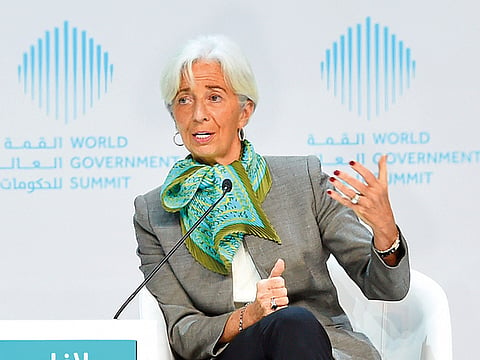Lagarde: Governments need to fix their roofs
IMF chief praises uae for pushing ahead with reforms in challenging times

Dubai: Countries should not focus on the recent market slump but on the imperative of change going forward and the need to “fix the roof”, said Christine Lagarde, managing director, International Monetary Fund (IMF) during the sixth World Government Summit (WGS).
The major share index in the United States fell 10 per cent from the recent high, which analysts call a correction, resulting in erosion of more than $5 trillion in market value. The decline in share prices was triggered by concerns of a faster than expected rise in rates due to inflation.
Speaking during a session titled “Using the Global Recovery to Create a Fairer World”, Lagarde said it is not too late for some deep-seated reforms to be made before the next financial crisis comes around, but it’s crucial to take the right steps while the “sun is still shining.”
The IMF last month revised its forecast for world economic growth in 2018, and 2019, saying that sweeping US tax cuts will boost investments in the US. The IMF forecast global growth of 3.9 per cent for this year and next year, a 0.2 percentage point increase from its October estimates.
“I would not focus on what happened the last few days but on the imperatives of change going forward and the need to the fix the roof,” she said.
She said in the UAE, that has been anticipated in due course. “Many reforms have been conducted in the UAE, but in the region there are countries that had plenty of time to fix the roof but haven’t done it. They now say they wished they had fixed the roof. It’s much more critical now and for some of them it’s very urgent to fix the roof,” she said.
Lagarde’s session was attended by His Highness Shaikh Mohammad Bin Rashid Al Maktoum, Vice-President and Prime Minister of the UAE and Ruler of Dubai, and Indian Prime Minister Narendra Modi.
Lagarde highlighted the importance of regulating activities and not entities, and on a cross-national basis, which is crucial to anticipate where the next crisis will come from.
“I think we need to shift to regulation of activities not entities, because it’s not going to be about banks or insurance. We need to anticipate where the next crisis will come from, will it be the shadow banking, will it be crypto currencies rising to the sky. Money knows no boundaries. It moves around, and those regulatory environment needs to be agreed internationally,” she said.
She also pointed out that waiting for the crisis to come makes it far more difficult to resolve.
“You need the courage to explain what you’re doing [as a country]. Whether you are raising VAT because you are shifting to a new business model or whether you are doing structural reforms of another kind, you need that courage,” she said.
The UAE and Saudi Arabia implemented VAT from January 1, making them the first among their Gulf peers to implement a pioneering reform and the UAE has no plans to increase the tax any further.
Lagarde referred to the UAE saying: “Look what’s been done in the emirate, VAT is now in place since January 1, nobody likes it, but if you ask people do you like security, nice roads, public education, good hospitals, people will say yes, and that needs to be financed and transitioned to another model where the sources of revenue have changed.”
Highlighting the need to focus on youth, she said 60 per cent of the population are under 25 years old and a third are either unemployed or without training, while 40 per cent believe societies won’t offer them jobs.
“We need to focus our minds on such things, which are not just today’s problem but tomorrow’s problem as well. With five million new young people coming into the market every year for the next five years, artificial intelligence and the internet of things shouldn’t be geared towards billionaires but should be introduced in our economies to support the children of tomorrow.”
Sign up for the Daily Briefing
Get the latest news and updates straight to your inbox



